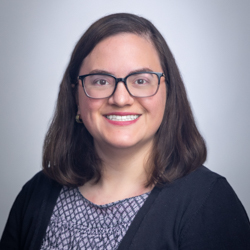 |
Amy Bachyrycz, PharmD Dr. Bachyrycz has experience in community outreach specifically to underserved and vulnerable populations. Her research efforts have focused on community pharmacies, opioid awareness and education, naloxone therapy, and cannabis medical education. Dr. Bachyrycz is the Advisor for Operation Substance Use Disorder, an initiative that empowers pharmacy students to collaborate with local schools and groups to target at-risk populations, offering substance use disorder education and resources, including dissemination of fentanyl test strips. |
 |
Ludmila N. Bakhireva, MD, PhD, MPH Dr. Bakhireva has an extensive expertise in establishing and successfully following up cohorts of high-risk vulnerable populations. With respect to substance exposures, her research efforts predominantly focused on alcohol, tobacco, opioids, medications for opioid use disorders (MOUD), and cannabis. Dr. Bakhireva is leading several multi-disciplinary clinical studies involving substance-using pregnant women and children affected by substance use disorders, including the ENRICH cohort and the HEALthy Brain and Child Development (HBCD) study. She is a Co-Investigator in the NIDA Southwest Clinical Trial Node and is leading clinical trials of innovative pharmacy-based interventions and implementation/dissemination projects, including pharmacy-based naloxone distribution program. |
 |
Amanda Barkley-Levenson, PhD Dr. Barkley-Levenson’s primary research area is the behavioral genetics of alcohol use disorder (AUD) and comorbid psychiatric disorders. She has extensive experience working with genetic mouse models of binge-like alcohol drinking and other behaviors associated with AUD. Current projects in her lab include using mutant mouse lines to validate novel genetic risk factors for problematic alcohol use that have been identified by human genome wide association studies, and investigating the underlying mechanisms by which these genes confer increased risk for AUD. Dr. Barkley-Levenson is also working in collaboration with the New Mexico Alcohol Research Center to understand how prenatal alcohol exposure may alter the functioning of brain motivational and reward systems in adulthood. |
 |
Paulina Deming, PharmD, PhC Dr. Deming has extensive expertise in the treatment of patients with hepatitis C virus. Her research efforts focus on clinical outcomes of patients with HCV infections, including in patients with active substance use disorders. Dr. Deming is currently a pharmacy champion for the PrIMO (Pharmacist-Integrated Medication Treatment for Opioid Use Disorder) study at Truman Health Services. |
 |
Kate Morton, PharmD, PhC, AAHIVP (She/Her) Dr. Morton is a Pharmacist Clinician and the Chief Clinical Officer at Albuquerque Health Care for the Homeless. She has clinical experience in HIV treatment and prevention, opioid use disorder (OUD), and community health, working with vulnerable populations. Her research has focused on long-acting HIV treatment and training pharmacy personnel to operationalize naloxone distribution for overdose prevention. Dr. Morton is a prescriber of buprenorphine for OUD and is committed to expanding access to OUD treatment for New Mexicans through Pharmacist Clinician prescribing. |
 |
Azizi Ray, Pharm.D., Ph.D. Dr. Ray’s preclinical research in behavioral neuropharmacology included stimulant use disorders with an emphasis on overdose deaths, neurotoxicity, and the misuse liability of traditional stimulants of misuse and synthetic cathinones. In Dr. Ray’s transition to clinical research, her primary research areas are pharmacists-led interventions to mitigate overdose deaths in justice-involved populations with opioid use disorder (OUD) and reduce racial/ethnic disparities in mental health care. Dr. Ray is a Co-Investigator on a pharmacist-driven study to support OUD screening, Narcan training, and initiation and retention of OUD treatment for justice-involved individuals. |
 |
Melissa H. Roberts, PhD, MS Dr. Roberts has focused on statistical methods and their applications to epidemiology and outcomes research. She has collaborated on a broad range of research studies and projects involving treatment and outcomes related to substance use and at-risk populations. Her research efforts have included studies related to alcohol, tobacco, opioids, medications for opioid use disorders (MOUD), and cannabis, as well as pharmacy-based interventions and implementation/dissemination projects. |
 |
Mikiko Y. Takeda, Pharm.D., MSCR, BCACP Dr. Takeda’s research focuses on opioid overdose prevention and chronic headaches. She was a co-investigator of several naloxone studies at the University of New Mexico Pain Consultation and Treatment Center (PCTC) and Addiction and Substance Abuse Program (ASAP). The studies were designed to prevent opioid overdose deaths among patients undergoing chronic opioid treatment (chronic pain and opioid replacement therapy for opioid use disorder). She has been involved in research programs led by Project ECHO and assessing how opioid-related tele-mentoring education could impact ECHO participants in improving their clinical skills to prevent opioid overdose. |